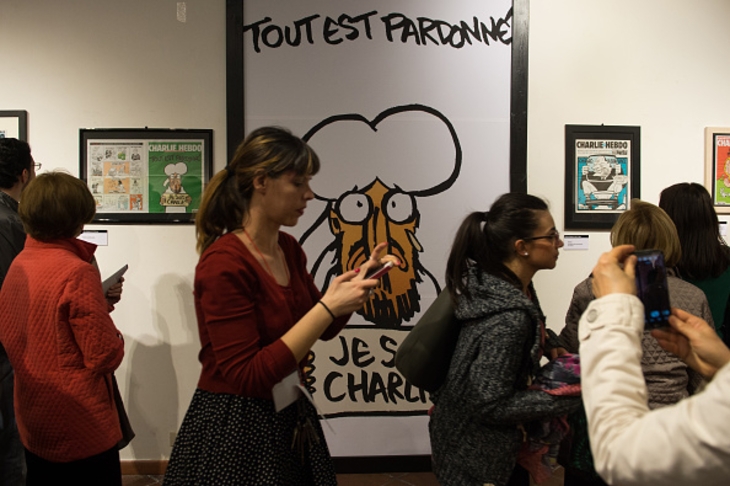On January 11 2015, I was one of two million people who marched slowly and silently through Paris to honour the memory of the people slaughtered days earlier for being blasphemers and Jewish.
It was an extraordinary day, an emotional one, too, soured only a little by the sight of presidents and prime ministers at the head of the march. These were the people who for years had been pretending there wasn’t a problem with the rise throughout the West of political Islam. Now, following the murder of the Charlie Hebdo cartoonists and the shoppers in the Kosher supermarket, they had muscled their way to the front to claim they were the standard-bearers of liberty in the fight against an evil ideology.
Among those present in Paris were David Cameron and Theresa May, then Prime Minister and Home Secretary, members of a government which had until recently included Baroness Sayeeda Warsi, the first Muslim Cabinet minister.
On the day of the march in Paris Warsi wrote a newspaper column in which she said: “As a person of faith and as a Muslim, I know the values and reputation of my faith – any faith – cannot be diminished by a cartoon, by anyone poking fun in a magazine….We live in a liberal democracy, where giving and taking offence is part and parcel of everyday life.”
On the Tuesday after the march May addressed the House of Commons, telling parliament: ” It was a very moving experience to be part of the march in Paris on Sunday…because of the reaction of the people alongside the march, who constantly expressed their support for all those who were standing for freedom of the press and the freedoms of our democracy.”
What has happened to the lofty sentiments of Warsi and May? In Wednesday’s Guardian Warsi tore into Boris Johnson for his comments in the Daily Telegraph in which he defended a woman’s right to wear a burka, even if it made her look like a letter-box.
Describing Johnson’s remarks as “indefensible”, Warsi said: “Language is so crucial. Politicians and policymakers particularly have a responsibility to help make the space of belonging bigger, to ease that path towards integration.”
‘Language’ was also the reason the Prime Minister took Johnson to task for his comments. “It’s clear that the language Boris Johnson used to describe people’s appearance has caused offence,” she said. “It’s not language I would have used and I think he was wrong to have used that language.” She also echoed calls for Johnson to apologise and said it was important that “people should have the right to practise their religion and, in the case of women and the burka and niqab, to choose how they dress”. That suggests the Prime Minister believes religion is more important than freedom of expression in the United Kingdom.
Judging from her remarks May has forgotten what she said in the wake of the Charlie Hebdo killings, and also her statement after last year’s Islamist attack on London Bridge when she declared that Britain and Islam needed to have “difficult, and often embarrassing, conversations” in order to counter the spread of a divisive and intolerant ideology.
One can agree or disagree with Johnson’s remarks but in a free society we must all surely agree that he has the right to his opinion. If we don’t then we’re entering undemocratic and dangerous territory where freedom of expression will wither. For the Tory peer, Andrew Cooper, to claim as he did on Friday that Johnson is guilty of the “casual courting of fascism” is incredible. Fascism is defined as authoritarian, oppressive, or intolerant views or practices; who’s being oppressive and intolerant? Johnson, who mocks the burka but doesn’t believe it should be outlawed, or his critics, who demand he be silenced and then punished for speaking his mind?
Is this the world in which we want to live? It wasn’t the world that one of the Charlie Hebdo cartoonists wanted. Asked in 2012 why he continued to mock Islam despite numerous death threats, Charb replied: “I’d rather die standing than live on my knees.”
We owe it to Charb, and to Charlie, and to Theo van Gogh, to uphold freedom of speech and not to be cowed into submission. If we choose silence then we no longer deserve to be part of the liberal democracy that Baroness Warsi once spoke of so highly.







Comments